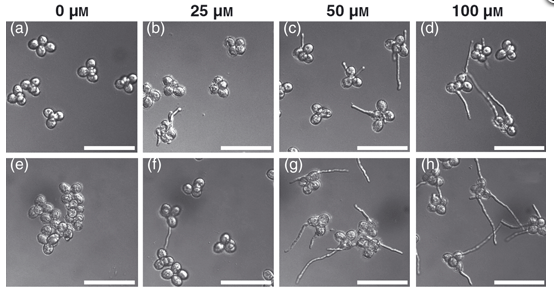News & Announcements
(September 2011)

While doing other experiments, we serendipitously observed that Arabidopsis pollen placed proximal to pistils always germinated well and sooner than those placed far away from pistils or when placed by themselves on pollen growth medium. This observation led to additional experiments to characterize pollen germination stimulation by Arabidopsis pistils. This work is now published as a research article in the Plant Journal.
Reference:
Sulfinylated azadecalins act as functional mimics of a pollen germination stimulant in Arabidopsis pistils
Yuan Qin1, Ronald J. Wysocki, Arpad Somogyi, Yelena Feinstein, Jessica Y. Franco, Tatsuya Tsukamoto, Damayanthi Dunatunga, Clara Levy, Steven Smith, Robert Simpson, David Gang1, Mark A. Johnson and Ravishankar Palanivelu.
Plant Journal 68 (5): 800-815.
Link to article or PubMed.
Abstract of the research article:
Polarized cell elongation is triggered by small molecule cues during development of diverse organisms. During plant reproduction, pollen interactions with the stigma result in the polar outgrowth of a pollen tube, which delivers sperm cells to the female gametophyte to effect double fertilization. In many plants, pistils stimulate pollen germination. However, in Arabidopsis, the effect of pistils on pollen germination and the pistil factors that stimulate pollen germination remain poorly characterized. Here, we demonstrate that stigma, style, and ovules in Arabidopsis pistils stimulate pollen germination. We isolated an Arabidopsis pistil extract fraction that stimulates Arabidopsis pollen germination, and employed ultra-high resolution electrospray ionization (ESI), Fourier-transform ion cyclotron resonance (FT-ICR) and MS/MS techniques to accurately determine the mass (202.126 Da) of a compound that is specifically present in this pistil extract fraction. Using the molecular formula (C10H19NOS) and tandem mass spectral fragmentation patterns of the m/z (mass to charge ratio) 202.126 ion, we postulated chemical structures, devised protocols, synthesized N-methanesulfinyl 1- and 2-azadecalins that are close structural mimics of the m/z 202.126 ion, and showed that they are sufficient to stimulate Arabidopsis pollen germination in vitro (30 μm stimulated approximately 50% germination) and elicit accession-specific response. Although N-methanesulfinyl 2-azadecalin stimulated pollen germination in three species of Lineage I of Brassicaceae, it did not induce a germination response in Sisymbrium irio (Lineage II of Brassicaceae) and tobacco, indicating that activity of the compound is not random. Our results show that Arabidopsis pistils promote germination by producing azadecalin-like molecules to ensure rapid fertilization by the appropriate pollen.
---------------------------------------------------------------------------------
Click here for earlier announcements.
|